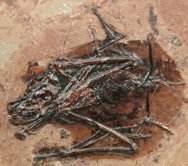 This
is a superb fossil of a small species of bat from the oil shale
Messel Pit deposits of Darmstadt, Germany, known as Palaeochiropteryx
tupaiodon. These ~50 million year old deposits are famous for their
exquisitely well preserved organisms, including some with the remains
of their last meal preserved within. Soft tissue preservation is
prevalent at the fossil site, just as readily seen here in preservation
of some delicate wing tissue. This
is a superb fossil of a small species of bat from the oil shale
Messel Pit deposits of Darmstadt, Germany, known as Palaeochiropteryx
tupaiodon. These ~50 million year old deposits are famous for their
exquisitely well preserved organisms, including some with the remains
of their last meal preserved within. Soft tissue preservation is
prevalent at the fossil site, just as readily seen here in preservation
of some delicate wing tissue.
The
genus Palaeochiropteryx had relatively broad, short wings, indicative
of adaptation for slow, highly maneuverable flight near the forest
floor. While some features such as the skull and skeleton are primitive,
the shape of the wings resembles that of the modern-day Hipposiderids
that have similar flight behavior. Many of the limb bones are in
articulation, and notice the intact foot. The skull is remarkably
well preserved, with all its teeth intact. This bat probably was
overcome by toxic gases from the lake while in low-level pursuit
of flying insects. Due to this fragility of the oil shale, this
specimen, like all from the locality, has been embedded in resin
to allow preparation. The fossil is then flipped over and the matrix
removed on the opposite side. A final coating of resin serves to
preserve the specimen as seen here. The genus is extinct. |